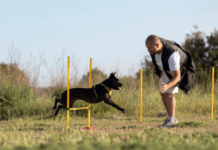Last Updated on November 16, 2023 by Dogs Vets
The Benefits of Professional Dog Training in Plano
Getting a new puppy or dog is an exciting time. You have a new furry friend to bond with, go on walks, and snuggle on the couch. However, owning a dog comes with a lot of responsibility.
Beyond providing food, water, shelter, and basic care, dogs need training and socialization to learn good behaviors and become well-adjusted companions. A professional dog trainer in Plano can set your pup up for success.
Teaching Basic Commands
One of the priorities with a new dog should be mastering basic obedience commands. Sit, stay, come, down, leave it, and loose leash walking are foundations every dog needs to learn. While you can certainly work on training yourself, a professional dog trainer will have experience and techniques to communicate these cues to your dog effectively.
They can point out subtle body language signs from your dog and help reinforce behaviors consistently.
Professional dog trainers use positive reinforcement methods to make training an enjoyable experience for you and your dog. Food rewards, praise, and play motivate dogs to want to perform commands.
Professional trainers know how to phase out treats and use variable reward schedules to prove behaviors. Trying to train basic commands yourself can lead to frustration if your dog is struggling to understand what you want. Professional help gets you over training hurdles.
Correcting Unwanted Behaviors
Puppies and adult dogs often demonstrate undesirable behaviors like jumping, nipping, barking, chewing, digging, and not listening. You need to curb these behaviors before they become ingrained habits.
A professional dog trainer can assess your dog and pinpoint why they exhibit specific unwanted behaviors. The trainer can then develop a customized training plan to replace bad behaviors with good ones.
For example, your dog may jump on you when you get home because they are excited.
A trainer will teach you to avoid rewarding the jump by waiting for calm behavior before giving attention. They can also suggest alternate outlets for your dog’s energy, like a vigorous play or training session when you return home.
Implementing protocols consistently under the guidance of a trainer will help resolve unwanted behaviors faster.
Socialization with Other Dogs
Dogs are social pack animals that need regular interaction with other dogs to prevent behavioral issues stemming from fear, lack of social skills, or frustration.
Professional dog trainers in Plano frequently offer group training classes that allow well-supervised socialization with new dogs. This helps dogs learn how to interact with different dogs properly. Owners also learn how to recognize appropriate play and when to intervene in unsafe interactions.
Group classes provide structure for working on obedience skills like recalls, loose leash walking, and place commands with the distraction of other dogs present. These group settings model real-world scenarios dogs will encounter in environments like dog parks.
The feedback from professional trainers during group sessions is invaluable to supporting proper socialization.
Public Obedience
Mastering obedience commands is an important first step, but proofing them in public is another skill. Dogs need conditioning to listen and focus on owners around real-world distractions like people, cars, other dogs, and kids playing.
Professional dog trainers set up training sessions at parks, trails, downtown areas, and pet stores to practice public obedience.
Dogs learn that commands remain the same regardless of the environment. The expert feedback from trainers in these sessions prevents reinforcement of poor behaviors a dog may try to get away with in exciting public places.
Troubleshooting behavior issues out in the real world accelerates a dog’s path to becoming a polite companion in any setting. Investing in professional public obedience training creates a foundation for welcoming your dog anywhere.
Solving Specific Behavior Problems
Beyond basic obedience and manners, some dogs develop specific behavior problems that require specialized intervention.
Issues like aggression with people or other dogs, anxiety and over-excitement, or phobias of things like loud noises, cars, or crowds can stem from genetics or poor socialization. These behaviors compromise public safety and quality of life for dogs and owners.
Experienced professional dog trainers have deep expertise across a wide range of potential behavior problems. They can accurately diagnose the root cause of unwanted behaviors and create customized training plans.
For example, a trainer may utilize desensitization and counter-conditioning for phobias and anxiety. Or they may incorporate management tools like muzzles and physical prompting for aggressive behaviors. Addressing these issues often worsens them, so seeking professional guidance is key.
Improving the Owner Experience
An overlooked benefit of professional dog training is improving the skills of the owner. Handling and communicating with dogs is a skill set very different from human interactions.
Professional dog trainers instruct owners on the proper timing of rewards, reading dog body language, using consistency in commands, and moving at a dog’s pace.
Trainers also coach owners on practical management techniques for real-life situations with dogs. Some examples are how to safely restrain a jumping dog, properly walk through doors and thresholds, and regain attention.
Owners learn just as much as the dogs during professional sessions, becoming competent handlers. A skilled owner enables ongoing learning and behavior reinforcement long after formal training ends.
Finding the Right Trainer
Not all dog trainers are created equal when it comes to experience, techniques, and results. Before investing in training, thoroughly research positive reinforcement options and avoid punitive methods.
Ask trusted vets, breeders, and other dog owners for referrals. Evaluate customer reviews and certifications of prospective trainers as well.
Look for professional trainers affiliated with respected organizations like the Certification Council for Professional Dog Trainers (CCPDT) or the International Association of Canine Professionals (IACP).
Meet with trainers before committing to ensure you and your dog are comfortable with their methods and personality. Investing in the right professional trainer sets your dog up for training success.
Conclusion
All dogs need training, but getting professional help is the most effective approach. Rather than losing time and patience trying to train your dog yourself, experienced dog trainers in Plano have the skills to train dogs and owners efficiently.
They turn good dogs into great dogs that are a pleasure to own. Professional training offers solutions, from basic obedience and socialization to resolving behavior issues. Investing in professional training services will greatly benefit your dog’s future behavior, outlook, and relationship with you.
Fact Check
We strive to provide the latest valuable information for pet lovers with accuracy and fairness. If you would like to add to this post or advertise with us, don’t hesitate reach us. If you see something that doesn’t look right, contact us!























